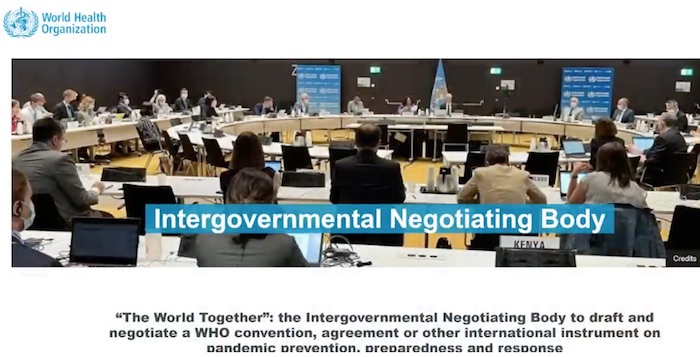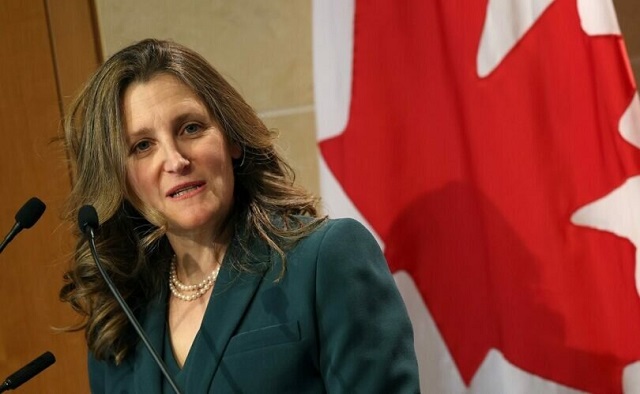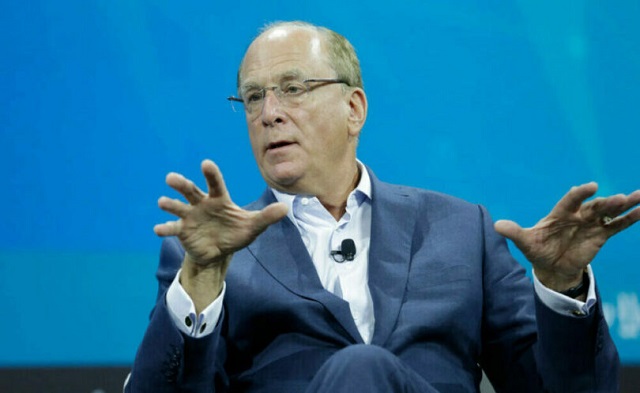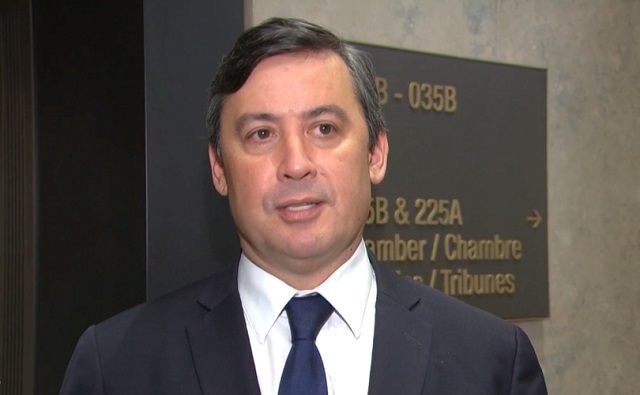Health
World Health Organization negotiating to take control “when the next event with pandemic potential strikes”

From Dr. John Campbell on Youtube
British Health Researcher Dr. John Campbell is raising the alarm about the latest moves by the World Health Organization to consolidate authority over governments all around the world.
As argued in UK Parliament, the World Health Organization is asking for a vast transfer of power and some MP’s are very much in favour of ceding power to the WHO.
In this video, Dr. Campbell outlines new regulations countries are currently negotiating to hand over vast new responsibilities to the WHO. The treaties would put the World Health Organization in charge – not just of the global health response, but of what information is shared, and how that information is shared. The regulations would also allow the WHO to take control not just in the event of a health emergency, but in the event of any emergency that could potentially impact public health.
From the commentary notes of Dr. John Campbell.
Countries from around the world are currently working on negotiating and/or amending two international instruments, which will help the world be better prepared when the next event with pandemic potential strikes.
The Intergovernmental Negotiating Body (INB) https://inb.who.int to draft and negotiate a convention, agreement or other international instrument to strengthen pandemic prevention, preparedness and response (commonly known as the Pandemic Accord).
Amendments to the International Health Regulations https://www.who.int/teams/ihr/working…) https://apps.who.int/gb/wgihr/pdf_fil… to amend the current International Health Regulations (2005) https://apps.who.int/gb/wgihr/ https://www.who.int/publications/i/it… 66 2005 articles
Underlined and bold = proposal to add text
Strikethrough = proposal to delete existing text (cut and paste does not copy strike through so I’ve put them in comic sans)
Article 1 Definitions
“standing recommendation” means non-binding advice issued by WHO
“temporary recommendation” means non-binding advice issued by WHO
Article 2 Scope and purpose including through health systems
readiness and resilience in ways that are commensurate with and restricted to public health risk – all risks – with a potential to impact public health,
Article 3 Principles
The implementation of these Regulations shall be with full respect for the dignity, human rights and fundamental freedoms of persons
Article 4 Responsible authorities
each State Party should inform WHO about the establishment of its National Competent Authority responsible for overall implementation of the IHR that will be recognized and held accountable
Article 5 Surveillance
the State Party may request a further extension not exceeding two years from the Director-General,
who shall make the decision refer the issue to World Health Assembly which will then take a decision on the same
WHO shall collect information regarding events through its surveillance activities
Article 6 Notification
No sharing of genetic sequence data or information shall be required under these Regulations.
Article 9: Other Reports
reports from sources other than notifications or consultations
Before taking any action based on such reports, WHO shall consult with and attempt to obtain verification from the State Party in whose territory the event is allegedly occurring
Article 10 Verification
whilst encouraging the State Party to accept the offer of collaboration by WHO, taking into account the views of the State Party concerned.
Article 11 Exchange of information
WHO shall facilitate the exchange of information between States Parties and ensure that the Event Information Site For National IHR Focal Points offers a secure and reliable platform
Parties referred to in those provisions, shall not make this information generally available to other States Parties, until such time as when: (e) WHO determines it is necessary that such information be made available to other States Parties to make informed, timely risk assessments.
Fraser Institute
Bill Maher is right about Canadian health care

From the Fraser Institute
Recently, popular American comedian and talk show host, Bill Maher, took aim at some of Canada’s public policy failings in one of his monologues. In entertaining fashion, Maher highlighted our high housing costs, unemployment rates and “vaunted” health-care system.
Indeed, citing work published by the Fraser Institute, he explained that after adjusting for age, Canada spends 13.3 per cent of our economy on health care (2020), the highest level of spending by a developed country with universal coverage that year. And that Canada has some of the poorest access to timely appointments with family doctors when compared to our peers.
Unfortunately, while that’s where his segment on health care ended, the bad news for the Canadian system doesn’t stop there.
On top of Canada continuing to be one of the most expensive universal health-care systems in the world, we get little in return when it comes to both available medical resources and wait times. For example, among high-income countries with universal health care, Canada has some of the lowest numbers of physicians, hospital beds, MRI machines and CT scanners.
And in Canada, only 38 per cent of patients report seeing a specialist within four weeks (compared to 69 per cent in the Netherlands) and only 62 per cent report receiving non-emergency surgery within four months (compared to 99 per cent in Germany).
Unfortunately, wait times in Canada aren’t simply long compared to other countries, they’re the longest they’ve ever been. Last year the median wait for a Canadian patient seeking non-emergency care reached 27.7 weeks—nearly three times longer than the 9.3 week-wait Canadians experienced three decades ago.
This raises the obvious question. How do other countries outperform Canada’s health-care system while also often spending less as a share of their economies? In short, their approach to universal health care, and in particular their relationship with the private sector, departs drastically from the approach here at home.
Australia, for example, partners with private hospitals to deliver the majority (58.6 per cent) of all non-emergency surgeries within its universal health-care system. Australia also spends less of its total economy (i.e. GDP) on health care but outperforms Canada on every measure of timely care.
Even with restrictions on the private sector, Canada has some limited experience that should encourage policymakers to embrace greater private-sector involvement. Saskatchewan, for example, contracted with private surgical clinics starting in 2010 to deliver publicly-funded services as part of a four-year initiative to reduce wait times, which were among the longest in the country. Between 2010 and 2014, wait times in the province fell from 26.5 weeks to 14.2 weeks. After the initiative ended, the province’s wait times began to grow.

More recently, Quebec, which has some of the shortest wait times for medical services in the country, contracts out one out of every six day-surgeries to private clinics within the publicly-funded health-care system.
Maher’s monologue, which was viewed by millions online, highlighted the key failings of Canada’s health-care system. If policymakers in Ottawa and the provinces want to fix Canadian health care, they must learn from other countries that deliver universal health-care at the same or even lower cost, often with better access and results for patients.
Author:
Health
Transgender activists are threatening the author of scathing UK report on child ‘sex changes’

Dr. Hilary Cass, author of the Cass Review, YouTube screenshot
From LifeSiteNews
That a female physician has been advised to stop taking the bus or the train because she might be assaulted by trans activists for attempting to protect children from a horrifying – and ongoing – medical scandal should be shocking to us all.
Dr. Hilary Cass, the 66-year-old physician who led the team behind the 366-page Cass Review, has become a target of trans activists as the repercussions of her findings reverberate through the political and medical establishment. The abuse is not confined merely to online; she has been advised not to use public transport for her own safety.
In an interview with the Times, Cass stated that critics of her report are putting children “at risk” by spreading “straight disinformation” and that criticisms, thus far, have been “completely wrong.” One Labour MP accused Cass of ignoring “100 transgender studies” in her findings. This, says Cass, is disingenuous in the extreme.
“I have been really frustrated by the criticisms, because it is straight disinformation,” Cass told the Times. “It started the day before the report came out when an influencer put up a picture of a list of papers that were apparently rejected for not being randomized control trials. That list has absolutely nothing to do with either our report or any of the papers.”
“If you deliberately try to undermine a report that has looked at the evidence of children’s healthcare, then that’s unforgiveable,” she continued. “You are putting children at risk by doing that.” The 100 papers that were allegedly “left out” of the report, Cass noted, were each individually examined by her team of researchers, who “pulled the results from the ones that were high quality and medium quality, which was 60 out of 103.”
Cass’s crime, of course, is that her report debunks the transgender narrative. She has been encouraged, she told the Times, by the impact of her report in many quarters – but the response elicited from trans activists has been “pretty aggressive” and she noted that the vitriol spiked each time the Cass Review reported something “people don’t like.”
“There are some pretty vile emails coming in at the moment,” she said of the profanity-laced digital missives coming her way. “Most of which my team is protecting me from, so I’m not getting to see them. What dismays me is just how childish the debate can become. If I don’t agree with somebody then I’m called transphobic or a TERF [trans-exclusionary radical feminist].”
When asked if the vitriol was wearing her down, Cass responded:
No… it’s personal, but these people don’t know me. I’m much, much more upset and frustrated about all the disinformation than I am about the abuse. The thing that makes me seethe is the misinformation. I’m not going on public transport at the moment, following security advice, which is inconvenient.
Indeed, six clinics, she said, refused to share research into the impact of puberty blockers – Cass called their reaction “coordinated” and “ideologically driven” and noted that “they were not particularly friendly to us when we approached.”
That medical institutions would refuse to cooperate on a study of the long-term impacts of the care they give to children is, any reasonable observer should agree, a very red flag – and there were more. Tavistock also refused to hand over data on detransitioners, which Cass called “very disappointing.” When asked about ideological capture, she told the Times that “there were certainly one or two individuals… who I would describe as activists among the staff,” although she added that “the majority of staff believed what they were doing was right.”
Although Cass will not be carrying out the recently-announced review of adult gender clinics, she did condemn GenderGP – which we have reported on in this space several times – for continuing to advertise and prescribe puberty blockers, noting that the “care” provided by Dr. Helen Webberley “certainly doesn’t come anywhere near anything one would recognise as adequate in terms of a proper assessment and exploration.”
That a female physician has been advised to stop taking the bus or the train because she might be assaulted by trans activists for attempting to protect children from a horrifying – and ongoing – medical scandal should be shocking to us all. The last few years have desensitized us to this sort of behavior. Fortunately, it appears that the Cass Review’s findings are having a seismic impact on the debate trans activists desperately tried to avoid, nonetheless.
-

 Housing2 days ago
Housing2 days agoTrudeau’s 2024 budget could drive out investment as housing bubble continues
-

 Alberta2 days ago
Alberta2 days agoAlberta government should create flat 8% personal and business income tax rate in Alberta
-

 Censorship Industrial Complex2 days ago
Censorship Industrial Complex2 days agoDesperate Liberals move to stop MPs from calling Trudeau ‘corrupt’
-

 Great Reset2 days ago
Great Reset2 days agoTerrorists Welcome: Chronic counterterrorism lapses at the border demand investigation
-

 National2 days ago
National2 days agoLow and middle income Canadians hit hardest by high marginal effective tax rates
-

 Health21 hours ago
Health21 hours agoTransgender activists are threatening the author of scathing UK report on child ‘sex changes’
-

 conflict2 days ago
conflict2 days agoCol. Douglas Macgregor: US is ‘facing disaster’ as it funds overseas wars while bankrupt
-

 Energy2 days ago
Energy2 days agoA Wealth-Creating Way of Reducing Global CO2 Emissions








